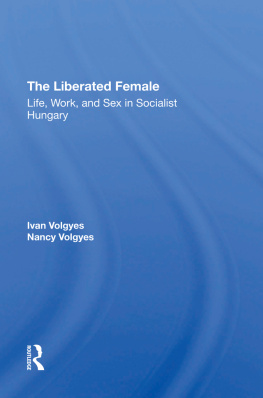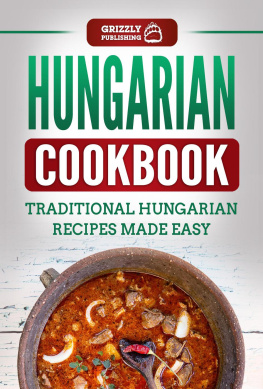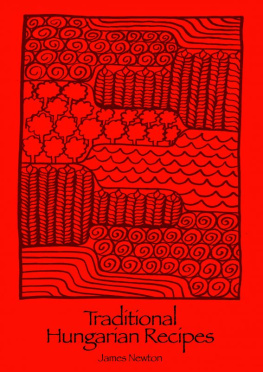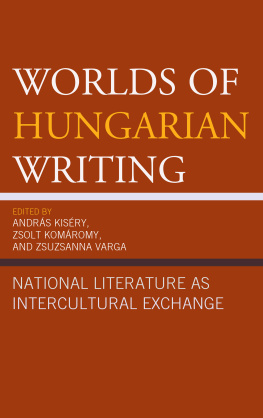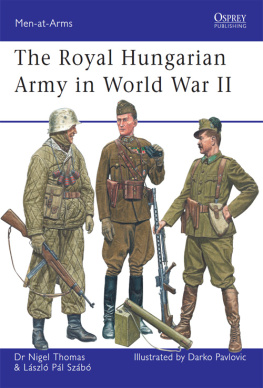The Liberated Female
Other Titles in This Series
Hungary: An Economic Geography, Gyrgy Enyedi
The Future of Agriculture in the Soviet Union and Eastern Europe: The 1976-1980 Five-Year Plans, edited by Roy D. Laird, Joseph Hajda, and Betty A. Laird
A Case Study of a Soviet Republic: The Estonian SSR, edited by
Tnu Parming and Elmar Jarvesoo
Population and Migration Trends in Eastern Europe, edited by
Huey Louis Kostanick
The German Democratic Republic: A Developed Socialist Society
edited by Lyman H. Legters
Yugoslavia After Tito: Scenarios and Implications, Gavriel D.
Ra'anan
Westview Special Studies on the Soviet Union and Eastern Europe
The Liberated Female: Life, Work, and Sex in Socialist Hungary
Ivan Volgyes and Nancy Volgyes
Owing to the influence of Marxist ideology and the peculiar nature of the Hungarian culture, women in Hungary have achieved legal equality with men. This legal status, however, has not allowed women a full share of their society's obligations, resources, and opportunities for self-fulfillment. Ivan and Nancy Volgyes describe the movement toward women's liberation in Hungary and offer reasons for its failure to achieve complete success. They suggest, as well, ways in which the women of the U.S. and other Western industrial nations can learn from the Hungarian experience.
Ivan Volgyes, a native of Budapest, is currently director of the Graduate Program on Rural Transformation and professor of political science at the University of Nebraska at Lincoln. Among Dr. Volgyes's numerous publications are Politics of the Communist Party States in Eastern Europe: Hungary (with Peter A. Toma) and Comparative Political Socialization: Eastern Europe. He is currently editing a ten-volume multimedia project on Eastern Europe. Nancy Volgyes is a graduate stydent in the Department of Geography at the University of Nebraska at Lincoln and is a translator of Hungarian short stories.
The Liberated Female
Life, Work, and Sex in Socialist Hungary
Ivan Volgyes and Nancy Volgyes
First published 1977 by Westview Press
Published 2019 by Routledge
52 Vanderbilt Avenue, New York, NY 10017
2 Park Square, Milton Park, Abingdon, Oxon OX14 4RN
Routledge is an imprint of the Taylor & Francis Group, an informa business
Copyright 1977 by Taylor & Francis
All rights reserved. No part of this book may be reprinted or reproduced or utilised in any form or by any electronic, mechanical, or other means, now known or hereafter invented, including photocopying and recording, or in any information storage or retrieval system, without permission in writing from the publishers.
Notice:
Product or corporate names may be trademarks or registered trademarks, and are used only for identification and explanation without intent to infringe.
ISBN 13: 978-0-367-29354-3 (hbk)
To Gabrielle Eva
May She Grow Up To Live in a Liberated World
This book is about an experiment to liberate women from servitude: the Hungarian experiment. It began shortly before the turn of the last century and has continued under various regimes to the present day. It is far from being a completed task, of course, as no human being can ever be completely free. But it is a process that has steadily gained ground through various socio-political and economic systems and deserves careful study.
The authors began gathering material for this volume in 1974; by the end of the year the first draft of the manuscript was ready. Because we were not permitted to sample the entire population with scientific survey methods, a large number of in-depth, open-ended interviews were relied on. Altogether more than three hundred people were interviewed, 85 percent of whom were women. Among them were members of women's councils, academicians, scientists, workers, clerks, seamstresses, teachers, journalists, actressesin short, women from all walks of life. Their modal opinions and shared problems are reflected in this volume. The candor and interest with which they responded made our work thoroughly enjoyable. For their cooperation we are greatly appreciative and extend a collective expression of gratitude to all of them.
We would like to single out a few people, however, both for their assistance to us and for the work they have done in the interest of female liberation. The staff of the Nok Lapja, Hungary's largest circulating "family" magazine and for the past several years one of the most controversial opinion forums in Hungary, deserves our special gratitude. The editor, Iren Nemeti, who granted the authors a special interview, has demonstrated rare journalistic courage in placing such exciting topics as the demographic and abortion question on the pages of her paper. Without her and her staffs efforts, it is doubtful whether such legislation as the leave for young mothers or institutions such as the "Four Seasons Marriage Bureau" (established in 1974) would have come into existence.
We would also like to give our special thanks to Dr. Janos Metneki, Deputy Minister of Health, Director of the Center for Health Information, Ministry of Health, and Dr. Attila Bagyoni, Deputy Director of the Center for Health Information, former Director of Pest County Council, Center for Health Development, who kindly and freely gave of their time and knowledge. In particular Dr. Bagyoni's pioneering works, along with those of Professor Imre Hirschler, Bela Buda and Gyorgy Seregely, have greatly contributed to the much needed dissemination of sexual information and the introduction of sexual education topics into school curricula.
Thanks are also due to Professor Gyorgy Ranki of the Historical Institute of the Hungarian Academy of Sciences and Professor Gyorgy Enyedi of the Geographical Institute. Their comments and criticism were of invaluable aid to the authors in the final preparation of the historical section of this book.
Two conscientious editors must also receive acknowledgement for their work on this volume. Julie Robinson, who worked as the English editor of the New Hungarian Quarterly (Budapest) in 1973-1975 and Mervyn Seldon of Westview Press deserve our sincere thanks for their painstaking editorial assistance.
Finally, thanks are due to two official sources of scholarly support. The International Research and Exchanges Board of New York provided Ivan Volgyes support during a nine-months' stay in Eastern Europe in 1974-1975. Without the financial assistance of IREX for scholarly endeavor, the research for this manuscript could never have been completed.
Nancy Volgyes gratefully acknowledges the scholarship extended to her from the Hungarian Institute for Cultural Relations during 1974 for the purpose of studying Hungarian. That support was essential for the preparation of this manuscript.
Where possible, we have tried to omit unnecessary and often cumbersome quotations. Nonetheless, where statistical data was necessary, the sources have been identified. With the exception of our own interviews, only public sources were used and are all appropriately identified in the notes. All translations from the original sources, unless otherwise identified, are provided by the authors.
Lincoln, Nebraska, 1977
Ivan Volgyes
Nancy Volgyes
Part I
The Long Road to Freedom


